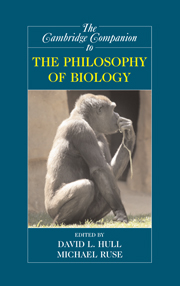Book contents
- Frontmatter
- 1 Adaptation
- 2 Population Genetics
- 3 Units and Levels of Selection
- 4 What’s Wrong with the Emergentist Statistical Interpretation of Natural Selection and Random Drift?
- 5 Gene
- 6 Information in Biology
- 7 Reductionism (and Antireductionism) in Biology
- 8 Mechanisms and Models
- 9 Teleology
- 10 Macroevolution, Minimalism, and the Radiation of the Animals
- 11 Philosophy and Phylogenetics: Historical and Current Connections
- 12 Human Evolution: The Three Grand Challenges of Human Biology
- 13 Varieties of Evolutionary Psychology
- 14 Neurobiology
- 15 Biological Explanations of Human Sexuality: The Genetic Basis of Sexual Orientation
- 16 Game Theory in Evolutionary Biology
- 17 What Is an ‘Embryo’ and How Do We Know?
- 18 Evolutionary Developmental Biology
- 19 Molecular and Systems Biology and Bioethics
- 20 Ecology
- 21 From Ecological Diversity to Biodiversity
- 22 Biology and Religion
- 23 The Moral Grammar of Narratives in History of Biology: The Case of Haeckel and Nazi Biology
- Reference List
- Index
- Series List
17 - What Is an ‘Embryo’ and How Do We Know?
Published online by Cambridge University Press: 28 April 2008
- Frontmatter
- 1 Adaptation
- 2 Population Genetics
- 3 Units and Levels of Selection
- 4 What’s Wrong with the Emergentist Statistical Interpretation of Natural Selection and Random Drift?
- 5 Gene
- 6 Information in Biology
- 7 Reductionism (and Antireductionism) in Biology
- 8 Mechanisms and Models
- 9 Teleology
- 10 Macroevolution, Minimalism, and the Radiation of the Animals
- 11 Philosophy and Phylogenetics: Historical and Current Connections
- 12 Human Evolution: The Three Grand Challenges of Human Biology
- 13 Varieties of Evolutionary Psychology
- 14 Neurobiology
- 15 Biological Explanations of Human Sexuality: The Genetic Basis of Sexual Orientation
- 16 Game Theory in Evolutionary Biology
- 17 What Is an ‘Embryo’ and How Do We Know?
- 18 Evolutionary Developmental Biology
- 19 Molecular and Systems Biology and Bioethics
- 20 Ecology
- 21 From Ecological Diversity to Biodiversity
- 22 Biology and Religion
- 23 The Moral Grammar of Narratives in History of Biology: The Case of Haeckel and Nazi Biology
- Reference List
- Index
- Series List
Summary
Because of recent public excitement about cloning and embryonic stem cell research, more people than just developmental biologists are busily talking about embryos. Human embryos are central players in proposed legislation at state, federal, and international levels. But what is meant by an embryo? Rarely is the term defined or defined clearly. Yet the term is used in quite different ways and has evolved over time.
How have meanings changed, and for what reasons? What is the relationship between public and scientific understandings of embryos? Here, the focus is most directly on evolving understandings of the biological embryo, including recent shifting public meanings. In each case, both metaphysical and epistemological considerations are important. Yet only after the emergence of in vitro fertilization did the embryo become an object of significant ethical concern, and only with cloning and human embryonic stem stem cell research was it widely seen as an object of social concern. This essay considers the changing understandings of embryos.
Since at least 1771, with the appearance of the first edition of the Encyclopedia Britannica, the embryo has been seen as the earliest - and undifferentiated - stage of an individual organism's development. The embryonic stage was clearly separated from the fetal stage, with the first giving way to the second as form gradually emerged from unformed matter.
- Type
- Chapter
- Information
- The Cambridge Companion to the Philosophy of Biology , pp. 324 - 341Publisher: Cambridge University PressPrint publication year: 2007
- 1
- Cited by



